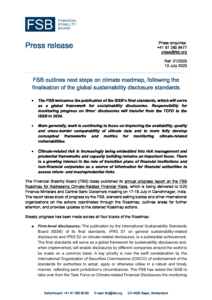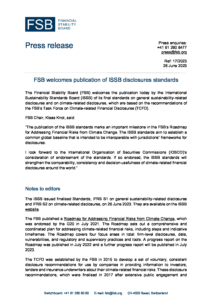In July 2021, the Financial Stability Board published a comprehensive Roadmap to address climate-related financial risks. It addressed the need for coordinated action with the large and growing number of international initiatives underway by outlining key actions to be taken by standard-setting bodies and other international organisations over a multi-year period in four key policy areas: firm-level disclosures, data, vulnerabilities analysis, and regulatory and supervisory practices and tools. The G20 has asked the FSB to deliver annual progress reports on the Roadmap.
Climate-related events are becoming ever more common, and this is leading to a growing focus on potential risks climate change could pose to financial stability. A manifestation of physical risks as well as a disorderly transition to a low-carbon economy could have destabilising effects on the financial system, such as a rise in risk premia and falling asset prices. Climate-related risks may also be amplified by the financial system, across borders and across sectors. The increased frequency and intensity of extreme weather and climate-related events, and the intense debate about current and future energy policies in many jurisdictions, highlight that this is not just a long-term issue or tail event. It also emphasises the importance of continued progress to embed effective risk management practices and strengthen financial system resilience to the risks posed by climate change.
This progress report has been prepared in consultation with standard-setting bodies and other relevant international bodies. The progress report aims to:
-
Take stock of further progress made in the year since the first annual Roadmap progress report was published in July 2022
-
Identify and address areas requiring further attention
-
Strengthen coordination across the different international initiatives
-
Provide updates where needed to the detailed Roadmap actions
The report also serves as input to broader international policy considerations, such as at the G20, G7 and UN, as well as to the work under the G20 Sustainable Finance Working Group (SFWG) roadmap on sustainable finance.
Key building blocks and goals
| Building block | Goal |
|---|---|
| Block 1: Disclosures | Achieve globally consistent, comparable, and decision-useful public disclosures by firms of their climate-related financial risks |
| Block 2: Data | Establish a basis of comprehensive, consistent, and comparable data for monitoring climate-related financial risks globally |
| Block 3: Vulnerability analysis | To more systematically assess and better understand climate-related financial vulnerabilities and potential financial stability impacts |
| Block 4: Regulatory and supervisory practices and tools | Establish effective and, where useful and appropriate, consistent supervisory and regulatory approaches and tools to address climate-related risks, both within individual sectors and at the system-wide level |

